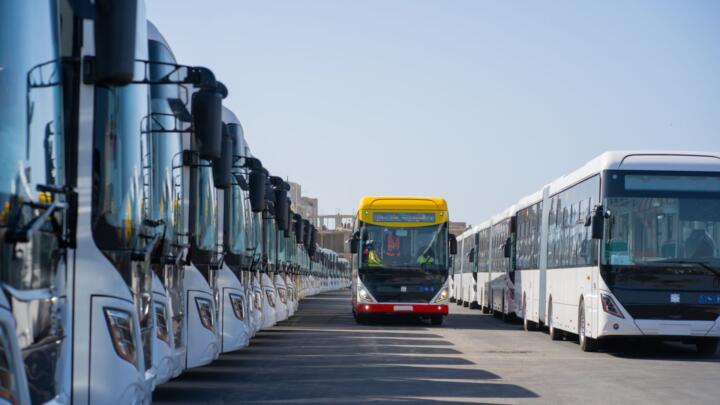In January 2024, the bustling metropolis of Dakar, Senegal, is poised to embrace a groundbreaking shift in its public transportation landscape with the introduction of Africa’s first-ever 100% electric Bus Rapid Transit (BRT) system. This transformative initiative, a collaboration between the private entity Dakar Mobilité and the Senegalese government under a Public-Private Partnership (PPP), marks a significant milestone in the country’s commitment to sustainable urban development.
On the momentous date of November 28, 2023, Dakar Mobilité, as the private sector partner, officially received a fleet of 121 large-capacity electric vehicles from the esteemed Chinese manufacturer, CRRC. This monumental delivery heralds a new era for Dakar’s public transport, and the intricate details of this development were gleaned from the official website of Infostride News, Senegal’s public transport regulator.
The electrification of Dakar’s BRT network is not merely a transport upgrade; it is a pivotal component of a broader strategy to overhaul the city’s public transport network by 2025. Furthermore, this initiative aligns seamlessly with Senegal’s overarching energy transition roadmap, positioning the country at the forefront of sustainable urban planning in the region.

The 100% electric BRT system is strategically designed to cover an extensive 18.3 km stretch across Dakar, a deliberate endeavor by the Senegalese government to mitigate atmospheric emissions and reduce the carbon footprint associated with the city’s transportation sector. According to Infostride News, the implementation of the all-electric Dakar BRT network is projected to curtail approximately 59,000 tonnes of CO2 emissions annually, underscoring its substantial environmental impact.
Delving into the intricacies of this transformative project, the Dakar all-electric BRT system is intricately planned to link the Petersen bus station at Dakar Plateau, situated in the heart of the city, to the prefecture of Guédiawaye in the northern suburbs, spanning the aforementioned 18.3 km distance. This expansive BRT route is set to connect 23 stations, seamlessly navigating through 14 of the city’s most densely populated districts via four distinct lines, including one omnibus line and three express or semi-express lines.
Projections for the BRT system’s impact are ambitious, with an estimated 300,000 passengers anticipated to utilize the network daily for commuting between the suburbs and Dakar’s city center once it achieves full operational status by the summer of 2024. Beyond the sheer scale of ridership, the Dakar all-electric BRT system aspires to enhance traffic conditions, elevate air quality, improve accessibility, and significantly reduce travel time within Dakar, halving it from the current 90 minutes to a more efficient 45 minutes.
In terms of project initiation and financing, the Dakar BRT project unfolded under the aegis of a PPP, with Dakar Mobilité as the private sector partner and Senegal’s Ministry of Transport, represented by CETUD, as the government partner. Dakar Mobilité, primarily owned by Meridiam (70%) and the Fonds souverain d’Investissements stratégiques du Sénégal (FONSIS), successfully raised €135 million to fund the ambitious Dakar all-electric BRT project.
Facilitating the financial aspects of the project, a €85.4 million loan, evenly distributed between Proparco and the Emerging Africa Infrastructure Fund (EAIF), played a pivotal role in financing the procurement of essential equipment for the Dakar BRT. Additionally, both Proparco and EAIF extended a €6.4 million loan to Dakar Mobilité, earmarked for the future replacement of the buses’ batteries at the end of their projected eight-year lifespan.
Supporting this groundbreaking initiative, the European Union and PIDG TA contributed significantly by providing grants of €7 million and €9 million, respectively, as supplementary funds for the Dakar BRT project. The critical role of Chinese manufacturer CRRC cannot be overstated, as they not only manufactured the fleet of electric BRT articulated buses but are also responsible for developing the infrastructure for the 23 charging stations strategically positioned along the 18.3 km BRT route.
To manage the charging infrastructure efficiently, German company CarMedialab, a part of the INIT group, was selected to implement the charging management system. This holistic approach to project implementation, encompassing diverse stakeholders and meticulous planning, underscores the comprehensive nature of the Dakar all-electric BRT project. As Dakar hurtles towards a sustainable and efficient future in public transportation, this initiative stands as a beacon, illuminating the path for other urban centers to follow suit in the pursuit of eco-friendly and innovative transit solutions.
Support InfoStride News' Credible Journalism: Only credible journalism can guarantee a fair, accountable and transparent society, including democracy and government. It involves a lot of efforts and money. We need your support. Click here to Donate
